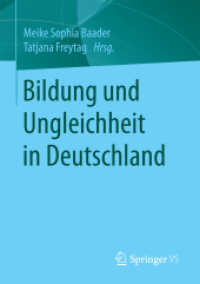- ホーム
- > 洋書
- > ドイツ書
- > Humanities, Arts & Music
- > Arts
- > theatre, ballett, film
Description
(Text)
In the eighteenth century, Italian opera was present in all parts of Europe - constituting a cultural medium which connected courts and centres of power and commerce from Naples to St. Petersburg. Previous research into opera as a European phenomenon has mostly focused on composers, scores and locations, less so on artistic personnel. This increasingly appears as an oversight, given that recent studies concerning the role of the singers in the production process have suggested that the single work of Italian opera was marked much more by the respective production process and every single performance than previously assumed: Singers, dancers, musicians, librettists and "Capellmeister" (not necessarily the composers themselves) would generate a new operatic works through their own creative activity every night, adjusting them to the performance conditions in a process of permanent transformation. Furthermore, the artists assembled either in cooperatives (travelling ensembles) or employed individually in changing engagements substantially contributed to the fact that operas could be performed across Europe, on the basis of a well-functioning network and system of communication. The book presents the first annotated edition of the mid-eighteenth century correspondence between the musicians and partners in marriage, Franz and Marianne Pirker, who both were connected to Pietro Mingotti's opera company. The letters shed new light on opera business and the musician's respective experiences in biography and profession, their social environment and their integration into social structures, as well as their career strategies between mobility and settledness.
(Author portrait)
ist wissenschaftlicher Mitarbeiter Arbeitsstelle der Gluck-Gesamtausgabe (Akademie der Wissenschaften Mainz) an der Universität FrankfurtBrandenburg, Danielist wissenschaftlicher Mitarbeiter Arbeitsstelle der Gluck-Gesamtausgabe (Akademie der Wissenschaften Mainz) an der Universität Frankfurt








